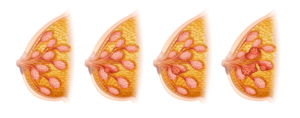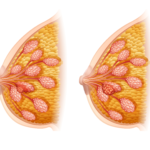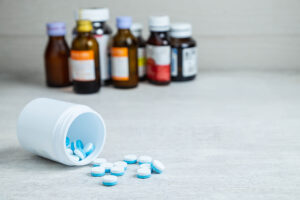Most patients getting chemotherapy tend to gain rather than lose weight. This seems to be particularly true for breast cancer patients. Research has found that weight gain increases the risk of breast cancer recurrence. After breast cancer surgery, many women experience negative changes to their body image, and weight gain can exacerbate this.
Causes Of Weight Gain with Chemotherapy
The reasons a patient may gain weight while receiving chemotherapy
Weight gain is more common during chemotherapy treatment for certain kinds of cancer, including breast cancer, ovarian cancer, and prostate cancer. This may result from the combination of chemotherapy along with hormone therapy and other medications typically used to treat these cancer types.
Chemotherapy may cause swelling (edema), leading the body to retain extra fluid (fluid retention) or lymphedema.
You may feel hungrier while undergoing chemotherapy, or you may feel nauseous and then relief when you eat.
You may be exercising less because chemotherapy causes you to feel fatigued.
Chemotherapy may cause menopause in some women, which may lead to a decrease in metabolism.
Certain types of cancer, such as ovarian cancer, are associated with weight gain.
Your doctor may prescribe steroid medication during chemotherapy treatment. Steroids may help lower inflammation and treat nausea. However, steroids may also increase your appetite and fullness in the abdomen, face, and neck.
For breast, prostate, testicular, or uterine cancer, you also may receive hormone therapy. These therapies may lower the amount of estrogen or progesterone in females and testosterone in men. Lowering these hormones may cause you to increase fat while decreasing your metabolism and muscle mass.
A cancer diagnosis may lead you to feel more stress, and that may prompt you to eat more and put on weight.
Be sure to schedule regular checkups and screenings for other conditions while on chemotherapy, such as diabetes or high blood pressure, as they may also be related to weight.
Gaining or losing a few pounds is normal, but a considerable weight change (5% to 10%) of your total body weight — could affect your health.
Breast cancer treatments that are associated with weight gain or loss:
Lxempra (chemical name: ixabepilone)
Hormonal therapy:
Arimidex (chemical name: anastrozole)
Aromasin (chemical name: exemestane)
Evista (chemical name: raloxifene)
Fareston (chemical name: toremifene)
Faslodex (chemical name: fulvestrant)
Femara (chemical name: letrozole)
tamoxifen
Avastin (chemical name: bevacizumab)
Other medicines you may be taking during treatment, including pain medications, anticonvulsants, bisphosphonates (bone-strengthening medicines), and steroids, can contribute to weight gain or loss.
Managing Weight Changes
If you’re concerned you’ve gained or lost too much weight, talk to your doctor. Together, you can figure out a healthy weight and develop a plan for eating and exercising to help you reach it. You also may want to talk to a registered dietitian if you’d like more detailed information about nutrition during breast cancer treatment.
Managing Weight Gain
Eat a healthy diet full of vegetables, fruits, and whole grains.
Limit saturated fat, salt, sugar, and alcohol to reduce calories.
Get moving. Exercise is now considered an essential part of daily life, and it was added to the U.S. government’s guide to healthy eating. Aim for 3 to 5 hours a week of moderate exercise (walking at an average pace).
Managing Weight Loss
- Eat small meals or snacks every hour to ensure you get enough calories.
- Snack on foods high in protein but low in fat, such as yogurt and cottage cheese, lean meat or fish, and lentils.
- Use low-fat milk in some recipes instead of water.
Maintain Your Weight While on Chemotherapy
- Eat breakfast. It keeps your body from going into starvation mode, where it wants to hang on to every calorie.
- Keep healthy snacks close. When that abnormally intense hunger hits, you’ll want to eat anything you can get your hands on quickly. Keep snack-size vegetables (and some low-fat dips) within easy reach.
- Keep unhealthy food out of reach. This can be challenging if the people you live with want their junk food, but you can tell them that depriving themselves of food for a while is an excellent way for them to support you. On the other hand, it’s OK to have the odd treat, even daily.
- Eat fruit in moderation. Fruit is an excellent source of essential vitamins but contains lots of sugar (especially grapes, bananas, and mangoes). Consume at least two servings of vegetables for every serving of fruit. Juicing is not essential. Grinding up fruits and vegetables isn’t any healthier than eating them whole. Drink all the pulp for juices, as the fiber fills you up and fights constipation.
- Carbs aren’t all bad. Baked potatoes (with their skins), brown rice, buckwheat (kasha), whole wheat pasta, and quinoa have many vitamins and healthy fiber. Just keep the portions moderate.
- Protein is essential. Try to have at least a half-cup of lean protein at every meal. Unsweetened yogurt, cottage cheese, lean meat, chicken/turkey without the skin or coating, chickpeas, beans, or low-fat soy products (soy does not make breast cancer grow!) are all excellent choices. Nuts are also an excellent source of protein but are high in fat. Limit nuts to one handful (or 1/3 cup) per day. Beans, buckwheat, and quinoa are grains but have lots of protein.

- Eat supper early. You’ll be less likely to overeat if you’re not ravenously hungry.
- Limit snacking after supper. People are the least active after supper, so anything you eat gets stored as fat. This will also make you less likely to be hungry the following morning.
- Exercise. At least 30 minutes daily. It burns calories and boosts metabolism, so you burn more calories daily. Exercise can also help cope with side effects. Find activities you enjoy so exercise becomes fun and relaxing rather than a chore. Don’t forget simple things like taking the stairs instead of the elevator, dancing, and brisk walking (outside or in a mall if the weather is terrible). You can also find many varied home workouts online. If you haven’t been active, talk to your care team.
- Mental health is health. Many women have a difficult time coping with their diagnosis and treatment. Reach out and get support. Ask your doctor or care team for a referral. For sensitive, caring, experienced social workers, psychologists, and psychiatrists.
Cancer Treatments and Involuntary Weight Gain
There are several, but the biggest is probably steroids. These are prescribed to prevent inflammatory and anaphylactic reactions to chemotherapy, to reduce swelling in patients with brain tumors, and as a cancer-fighting agent used to treat cancers such as lymphoma/myeloma. The downside is that steroids also act as a significant appetite stimulant, which can motivate overeating.
Another common cause of involuntary weight gain is hormone-suppressing treatments, such as those received by patients with breast cancer or prostate cancer. Hormones have a monstrous effect on metabolism. Hormonal therapies for breast and prostate cancer can result in involuntary weight gain.
Some women may also experience fatigue during treatment, which limits their motivation and ability to exercise regularly or become more physically active. Chemotherapy may also affect a person’s metabolic rate.
Additionally, some treatments can send women into menopause, a time when some people tend to put on a few extra pounds.
Lastly, fear: the fear of losing weight. Sometimes, patients are so afraid that they’ll become emaciated or unable to eat that they force themselves to do so while they still can, even when they’re not losing weight at all. Over time, that can lead to weight gain.
Weight Can Affect Breast Cancer Outcomes
If you have obesity or are overweight at the time of diagnosis, your prognosis can be poorer. In addition to its effects on prognosis, being overweight and obese can also affect your quality of life and increase your chances of developing additional conditions such as type 2 diabetes and cardiovascular disease.
According to the Centers for Disease Control and Prevention (CDC), obesity is typically defined as having a body mass index (BMI) of 30 or higher, while BMI for someone overweight is 25–30.
Additionally, someone’s risk of breast cancer-related death also increases if they gain weight during or after breast cancer treatment, per the same study; however, in the breast cancer cells of women with a BMI over 30 and breast cancer cells in women with lower BMIs. The women with higher BMIs had breast cancer cells with more inflammation and different mutations.
Your doctor can discuss strategies to reduce or minimize weight gain during and after treatment. These may include lifestyle changes, such as changes to your diet or the addition of a regular exercise routine.
SUMMARY
There’s no guarantee that you will gain weight if you begin treatment for breast cancer. But many people do.
When to connect with your care team
Some weight gain may be a side effect of cancer treatment or chemotherapy. But there are times when you’ll want to inform your physician about weight gain, including if you’re:
• Putting on 5 pounds or more a week
• Experiencing new onset of breath
• Feeling dizzy or confused
• Having new signs of fluid retention, such as new arm or leg swelling, jewelry that fits tighter than it used to, or less flexibility
• Finding the weight gain concerning for any other reason
If you’re concerned about the potential effects of extra weight on your physical and mental health, talk with your cancer care team. They may be able to recommend lifestyle modifications that work with your treatment plan and help you minimize potential weight gain during breast cancer treatment.
REFERENCES
Breastcancer.org
Cancercenter.com
City of Hope
Healthline
MD Anderson Cancer Centers
Your Health Matters









